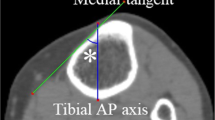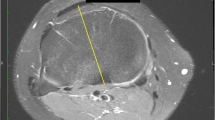Abstract
Purpose
Our experience with computer plans of kinematically aligned total knee arthroplasty showed that the anteroposterior (AP) axis of the tibial component when viewed in an axial plane did not consistently intersect either the medial border or the medial 1/3 of the tibial tubercle. The purposes were (1) to determine the variability in the mediolateral location of the tibial tubercle with respect to the medial tibia on the magnetic resonance image (MRI) of the knee and (2) to determine whether the AP axis of the kinematically aligned tibial component intersects either the medial border or the medial 1/3 of the tibial tubercle.
Methods
One hundred and fifteen knees in 111 consecutive subjects treated with total knee arthroplasty were studied. The mediolateral location of the tibial tubercle was measured from a magnetic resonance image (MRI) of the knee. The distances between the AP axis of the tibial component and the medial border of the tibial tubercle and between the AP axis and the medial 1/3 of the tibial tubercle were measured from a computer plan of the reconstructed knee.
Results
On the MRI, the medial border of the tibial tubercle varied 15 mm from the medial border of the tibia. On the computer plan, the AP axis of the tibial component in an axial view of the tibia did not intersect either the medial border (p < 0.0001) or the medial 1/3 of the tibial tubercle (p < 0.0001). In 70 and 86 % of knees, the mediolateral distance of the AP axis of the tibial component was 2 mm or greater from the medial border of the tibial tubercle and the medial 1/3 of the tibial tubercle, respectively, which causes a clinically meaningful error in rotation of 5° or more.
Conclusions
Because the mediolateral location of the tibial tubercle varies, the medial border and medial 1/3 of the tibial tubercle are not reliable landmarks when the goal is to kinematically align the rotation of the tibial component on the tibia.
Level of evidence
IV.





Similar content being viewed by others
References
Abadie P, Galaud B, Michaut M, Fallet L, Boisrenoult P, Beaufils P (2009) Distal femur rotational alignment and patellar subluxation: a CT scan in vivo assessment. Orthop Traumatol Surg Res 95:267–271
Akagi M, Mori S, Nishimura S, Nishimura A, Asano T, Hamanishi C (2005) Variability of extraarticular tibial rotation references for total knee arthroplasty. Clin Orthop Relat Res 436:172–176
Akagi M, Oh M, Nonaka T, Tsujimoto H, Asano T, Hamanishi C (2004) An anteroposterior axis of the tibia for total knee arthroplasty. Clin Orthop Relat Res 420:213–219
Baker PN, van der Meulen JH, Lewsey J, Gregg PJ (2007) The role of pain and function in determining patient satisfaction after total knee replacement. Data from the national joint registry for England and Wales. J Bone Jt Surg 89B:893–900
Barrack RL, Schrader T, Bertot AJ, Wolfe MW, Myers L (2001) Component rotation and anterior knee pain after total knee arthroplasty. Clin Orthop Relat Res 392:46–55
Bellemans J, Colyn W, Vandenneucker H, Victor J (2012) The Chitranjan Ranawat award: is neutral mechanical alignment normal for all patients? The concept of constitutional varus. Clin Orthop Relat Res 470:45–53
Berger RA, Crossett LS, Jacobs JJ, Rubash HE (1998) Malrotation causing patellofemoral complications after total knee arthroplasty. Clin Orthop Relat Res 356:144–153
Bonner TJ, Eardley WGP, Patterson P, Gregg PJ (2011) The effect of post-operative mechanical axis alignment on the survival of primary total knee replacements after a follow-up of 15 years. J Bone Jt Surg 93B:1217–1222
Bourne RB, Chesworth BM, Davis AM, Mahomed NN, Charron KD (2010) Patient satisfaction after total knee arthroplasty: who is satisfied and who is not? Clin Orthop Relat Res 468:57–63
Chauhan SK, Clark GW, Lloyd S, Scott RG, Breidahl W, Sikorski JM (2004) Computer-assisted total knee replacement. A controlled cadaver study using a multi-parameter quantitative CT assessment of alignment (the Perth CT Protocol). J Bone Jt Surg 86B:818–823
Cobb JP, Dixon H, Dandachli W, Iranpour F (2008) The anatomical tibial axis: reliable rotational orientation in knee replacement. J Bone Jt Surg 90B:1032–1038
Coughlin KM, Incavo SJ, Churchill DL, Beynnon BD (2003) Tibial axis and patellar position relative to the femoral epicondylar axis during squatting. J Arthroplasty 18:1048–1055
Dossett GH, Swartz GJ, A EN, LeFevre GW, Kwasman BG (in press) Kinematic versus mechanically aligned total knee arthroplasty: a prospective randomized double blind study. Orthopedics 32:e160–169
Eckhoff D, Hogan C, DiMatteo L, Robinson M, Bach J (2007) Difference between the epicondylar and cylindrical axis of the knee. Clin Orthop Relat Res 461:238–244
Eckhoff DG, Bach JM, Spitzer VM, Reinig KD, Bagur MM, Baldini TH, Flannery NM (2005) Three-dimensional mechanics, kinematics, and morphology of the knee viewed in virtual reality. J Bone Joint Surg 87A(Suppl 2):71–80
Eckhoff DG, Bach JM, Spitzer VM, Reinig KD, Bagur MM, Baldini TH, Rubinstein D, Humphries S (2003) Three-dimensional morphology and kinematics of the distal part of the femur viewed in virtual reality. Part II. J Bone Joint Surg 85A(Suppl 4):97–104
Hollister AM, Jatana S, Singh AK, Sullivan WW, Lupichuk AG (1993) The axes of rotation of the knee. Clin Orthop Relat Res 290:259–268
Howell SM, Howell SJ, Hull ML (2010) Assessment of the radii of the medial and lateral femoral condyles in varus and valgus knees with osteoarthritis. J Bone Joint Surg 92A:98–104
Howell SM, Kuznik K, Hull ML, Siston RA (2008) Results of an initial experience with custom-fit positioning total knee arthroplasty in a series of 48 patients. Orthopedics 31:857–863
Howell SM, Kuznik K, Hull ML, Siston RA (2010) Longitudinal shapes of the tibia and femur are unrelated and variable. Clin Orthop Relat Res 468:1142–1148
Howell SM, Rogers SL (2009) Method for quantifying patient expectations and early recovery after total knee arthroplasty. Orthopedics 32:884–890
Huddleston JI, Scott RD, Wimberley DW (2005) Determination of neutral tibial rotational alignment in rotating platform TKA. Clin Orthop Relat Res 440:101–106
Ikeuchi M, Yamanaka N, Okanoue Y, Ueta E, Tani T (2007) Determining the rotational alignment of the tibial component at total knee replacement: a comparison of two techniques. J Bone Jt Surg 89B:45–49
Iranpour F, Merican AM, Dandachli W, Amis AA, Cobb JP (2010) The geometry of the trochlear groove. Clin Orthop Relat Res 468:782–788
Lewis P, Rorabeck CH, Bourne RB, Devane P (1994) Posteromedial tibial polyethylene failure in total knee replacements. Clin Orthop Relat Res 299:11–17
Lutzner J, Krummenauer F, Gunther KP, Kirschner S (2010) Rotational alignment of the tibial component in total knee arthroplasty is better at the medial third of tibial tuberosity than at the medial border. BMC Musculoskelet Disord 11:57
Nagamine R, Miyanishi K, Miura H, Urabe K, Matsuda S, Iwamoto Y (2003) Medial torsion of the tibia in Japanese patients with osteoarthritis of the knee. Clin Orthop Relat Res 408:218–224
Noble PC, Conditt MA, Cook KF, Mathis KB (2006) The John Insall award: patient expectations affect satisfaction with total knee arthroplasty. Clin Orthop Relat Res 452:35–43
Parratte S, Pagnano MW, Trousdale RT, Berry DJ (2010) Effect of postoperative mechanical axis alignment on the fifteen-year survival of modern, cemented total knee replacements. J Bone Joint Surg 92A:2143–2149
Siston RA, Goodman SB, Patel JJ, Delp SL, Giori NJ (2006) The high variability of tibial rotational alignment in total knee arthroplasty. Clin Orthop Relat Res 452:65–69
Tang WM, Zhu YH, Chiu KY (2000) Axial alignment of the lower extremity in Chinese adults. J Bone Joint Surg 82A:1603–1608
Uehara K, Kadoya Y, Kobayashi A, Ohashi H, Yamano Y (2002) Bone anatomy and rotational alignment in total knee arthroplasty. Clin Orthop Relat Res 402:196–201
Weber WE, Weber EFM (1836) Mechanik der menschlichen Gehwerkzeuge (Mechanics of the human walking apparatus). Verlag der Dietrichschen Buchhandlung, Göttingen
Yip DK, Zhu YH, Chiu KY, Ng TP (2004) Distal rotational alignment of the Chinese femur and its relevance in total knee arthroplasty. J Arthroplast 19:613–619
Conflict of interest
No authors have signed any agreement with a commercial interest related to this study, which would in any way limit publication of any and all data generated for the study or to delay publication for any reason. One of the authors (SMH) is a paid consultant for and receives royalties from Biomet Sports Medicine, Inc, and is a consultant for Stryker Orthopaedics. Two authors (SMH, MLH) receive research support from Stryker Orthopaedics.
Author information
Authors and Affiliations
Corresponding author
Rights and permissions
About this article
Cite this article
Howell, S.M., Chen, J. & Hull, M.L. Variability of the location of the tibial tubercle affects the rotational alignment of the tibial component in kinematically aligned total knee arthroplasty. Knee Surg Sports Traumatol Arthrosc 21, 2288–2295 (2013). https://doi.org/10.1007/s00167-012-1987-5
Received:
Accepted:
Published:
Issue Date:
DOI: https://doi.org/10.1007/s00167-012-1987-5




